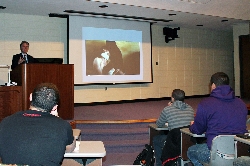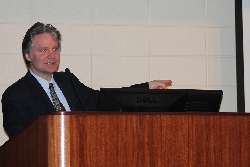University News
WIU Homeland Security Students Get Education about Arab Spring Ambiguities from Williams College Guest Lecturer
April 4, 2013
MACOMB, IL – Western Illinois University students were asked to explain what they saw in the 2011 photo that won the 55th annual World Press Photo Contest.
"Suffering" and "sympathy" were two descriptions the students—most of them minoring in homeland security in Western's School of Law Enforcement and Justice Administration (LEJA) and many of them with the future professional goal of pursuing a career in the homeland security field—used to describe an image of a wounded man being held in his mother's arms.
The photo—which was captured in a mosque in Yemen by Spanish photographer Samuel Aranda on assignment for the New York Times—was the start of a recent (March 19) Homeland Security Research Program (HSRP) lecture, "Dangerous Times Ahead? The Future of the Middle East," by Magnus T. Bernhardsson, professor of Middle Eastern history and chair of international studies at Williams College in Williamstown, MA.
"This photo won this award because it is supposed to represent the 'Arab Spring,' this major political event that has been happening in the Middle East since late 2010, early 2011. I think the reason this photo won this prestigious award is because it's a beautiful image—we have a fully clad mother in contrast to the bare-chested son, and the story behind the image is that the woman had been searching for her son after he had gone out to protest and had not come back. So she went from hospital to hospital, from mosque to mosque, to try and find her son. And, finally, after three days of searching, she found him," Bernhardsson said during his presentation. "But I also think people thought it really exemplified some of the ambiguities of the problems of the relationship between image—what we see, what we perceive in the news media—and what is actually happening on the ground. This picture was picked because of those ambiguities."
Bernhardsson's recent visit to Western was organized by Dean Alexander, associate professor in Western's School of LEJA and director of the Homeland Security Research Program. The session was the second in the HSRP lecture series this Spring 2013 semester; the third is set for 11 a.m. Tuesday, April 9, when Donald Kauerauf, chair of the Illinois Terrorism Task Force Emergency Management Agency, will speak in Stipes Hall 121.
"Without a doubt, the Arab Spring is a very important subject, not only for those who live in that region, but it is also significant for us in the United States. The purpose of the HSRP Lecture Series is to expose WIU students, faculty and the Macomb community with the insights and perspectives of law enforcement practitioners and academics on a variety of homeland security and national security issues," Alexander explained. "In doing so, we are able to obtain a better understanding of the complex and ever-evolving nature of such issues. Additionally, students are able to make contacts with the guest speakers in relation to internships, full-time positions and graduate school."
In addition, to his academic work at Williams College, Bernhardsson—who earned his bachelor's degree at the University of Iceland in Reykjavik in 1990 and received his doctorate in history, with distinction, from Yale University in 1999—serves as a political analyst of the Middle East.
"The biggest challenge at this point is the instability, violence and chaos in this area, which leads this whole region to be engulfed in instability. This is not good for the countries—and for the people of those countries—involved. And it is not good in terms of U.S. interests abroad and at home—for example, for resources like oil. This is one way the instability can affect U.S. interests on the home front," Bernhardsson noted in a brief interview after his lecture.
He also said education is one of the most important attributes of homeland security training.
"This is why I started my lecture with that 2011 image. I wanted the students to understand we should not judge and just read things on the surface. We need to examine the images emerging from the Arab Spring and think about what the stories are behind them. We have to have a good historical context to view how these images emerge. Our ongoing education about this area of the world makes us aware of these issues and various players and aware of the various issues and possible outcomes," he explained. "That's a national security problem—if there is a lack of knowledge and if we operate from ideas based on clichés or not based on reality. We have to watch the situations closely and try to forge connections, people-to-people connections, institution-to-institution connections. On those levels, you can build good, trusting relationships. From these types of relationships, we'll be able to determine what is in our best interests. It's okay to disagree, but if we disagree without really knowing each other, we just suspect the worst from each other. But if I know the other party on a personal level, I may disagree, but at least we can sit down and talk and figure out if there is some sort of middle road that can satisfy us both."
One of the ways Western practices this institution-to-institution connection and disseminating education is through lectures like Berhnardsson's, as well as through Alexander's guest lectures. Alexander travels widely to lecture at institutions at home and abroad. As part of his work as the HSRP director and a faculty member in WIU's School of LEJA, in 2011, Alexander interviewed Fatah and Hamas prisoners incarcerated in an Israeli prison in Beersheba, the findings of which he uses in his instruction for WIU students, as well as in his guest lectures. He has also served as an invited lecturer to present his research findings at NATO's Centre of Excellence—Defense Against Terrorism in Ankara, Turkey. Since 2010, Alexander has presented lectures covering law enforcement responses to terrorism; terror financing; legal aspects of terrorism; the organized crime/terror nexus; terrorism and business; suicide bombings; terror group structures; and cyberterrorism at the NATO Centre in Turkey. Alexander has also lectured at NATO's Centre of Excellence—Human Intelligence in Oradea, Romania.
Alexander said that Bernhardsson's research and writing, as well as his own, provide insights and perspectives that are incorporated by military, law enforcement and intelligence professionals in their counterterrorism and other activities.
Since its Fall 2006 inception, the School of LEJA's Homeland Security Research Program has been involved in a number of activities, such as curriculum development, organizing events, as well as research and writing. As director, Alexander has spearheaded the development of the homeland security undergraduate minor, which is now one of the largest areas of minor study at Western, with more than 200 students. Through the HSRP, four new security-related courses have also been developed, including, "Terrorism and Law Enforcement;" Terror Financing'" "Legal Aspects of Terrorism" (all LEJA); and "Terrorism in South Asia."
For more information, contact Alexander at DC-Alexander@wiu.edu.
Posted By: Teresa Koltzenburg (WIUNews@wiu.edu)
Office of University Communications & Marketing



Connect with us: